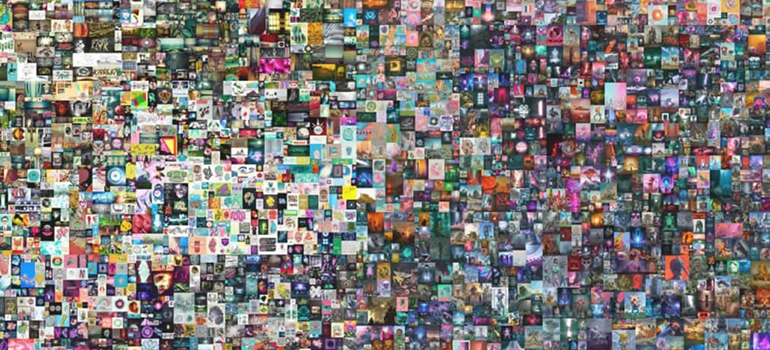
Photo (cropped): “The First 5000 Days” (Michael Winkelman, a.k.a. Beeple)
NFTs. Chances are, you have at least heard of them. But many people still don’t quite understand what they are, how they work, and how they can and are being used, much less what’s the big deal. Usually, if someone who is deeply passionate about NFTs tries to explain the concept to a newcomer, their eyes will glaze over with confusion. So, we’re here to break things down for you, and discuss how NFTs can benefit a small businesses.
What are NFTs?
NFT stands for Non-fungible token. This, in plain terms, refers to the fact that every NFT is completely unique and cannot be replaced or copied by another. They are similar to bitcoin in that they exist completely in the digital universe. However, NFTs that are traded are one-of-a-kind collectibles, each one different from the next.
NFTs are part of something called a Ethereum blockchain, which consists of all types of cryptocurrency, including bitcoin, Elon Musk’s dogecoin, and others. In other words, they can be bought, sold, and traded online in the same fashion without you ever seeing something tangible in your hands.
But what are they? They are digital forms of art. An NFT can be a drawing, piece of music or video, coupons, certificates, or some other similar form of artistic expression created by the owner. At its simplest form, NFTs are a 21st Century version of art collecting, though they can be more than that as well. The clincher: because NFTs can be traced back to the original creator via the blockchain, there’s no faking them – what’s yours is yours to store in a digital wallet, and anyone who tries to claim your unique NFT can be easily called out.
Instead of a renowned artist creating an elaborate painting or photograph, virtually anyone can create their own unique NFT and become a digital artist in his own right. If someone finds value in it, it can sell for hundreds, thousands, even millions of real dollars. Don’t believe it? The Non-fungible Tokens Quarterly Report for Q2 2021 saw more than $750 million in NFT sales, 175,000 wallets, and 48% growth during that quarter, and the numbers continues to rise. When Canadian musician Grimes released a 50-second video NFT, it sold for $390,000. Crypto Potato names the 10 most expensive NFTs ever sold, and they are all in the millions. The number-one NFT called The Merge – digital art created by an anonymous artist known only as Pak – sold for US$91.8 million. The NFT called The First 5000 Days, featuring a compilation of images in a form of a captivating mosaic (shown above), was sold by Michael Winkelman, who goes by the name of Beeple, for $69 million.
While an NFT can effectively be copied, similar to a photograph, or even knocked off like a painting, only the original artwork yields value. And the person who owns (or buys) it becomes the holder of that value, with the assurance that its authenticity is fully traceable.
How Are People and Businesses Using NFTs?
There’s a myriad of ways businesses can use NFTs.
Online Communities
The existence of NFTs has led to the creation of online communities with various themes, like the Pudgy Penguins NFT community, Bored Ape Yacht Club, CryptoPunk, and Dapper Lab’s NBA Top Shot. Members might share stories or memes, comment on one another’s avatars and creations, and simply support one another in their NFT involvement.
Targeting Collectors
People have found fruitful business opportunities in creating and selling NFTs. This might be by catching the eyes of collectors who want to get their hands on the latest NFT creation, often simply for no other reason than bragging rights that they are the only one to own it. It’s no different than someone jumping at the chance to own a limited edition “something.”
Recurring Revenue
Similar to other types of digital content, like photos, if an NFT is sold multiple times, the original owner can get a percentage of that sale, allowing for valuable recurring income. For businesses, this can create another source of revenue. Already, big brands like Marvel and Nike and celebrities like athlete Wayne Gretzky, actor William Shatner, and DJ deadmau5, have gotten in on the NFT game, as have businesses like Pizza Hut, Pringles, and Visa, by either buying, selling, or both.
Promotions
Businesses can use NFTs for single-use promotions, notes Inc.com, whether that’s a coupon, discount, or other type of deal. They are particularly attractive because an NFT is safe from counterfeiting since the source can always be tracked back to the original owner.
Gamification
Some companies have found potential opportunities with the gamification of NFTs, including being able to sell things like in-game accessories for a unique NFT. Needless to say, the app and gaming community, along with the idea of the metaverse, is likely looking at NFTs for future opportunities. Inc.com suggests that a local community, for example, could set up an NFT scavenger hunt with the purpose of driving customers to local businesses.
Exclusive Access & Customer Loyalty Programs
Other entertainment sources have found ways to use NFTs: a new show called Stoner Cats, for example, which stars A-listers Mila Kunis, Chris Rock, and Jane Fonda, requires you to buy a special NFT in order to watch.
Harvard Business Law notes that being able to track ownership of NFTs through the blockchain means they can function like a membership card or ticket, “providing access to events, exclusive merchandise, and special discounts.” It’s easy to see, then, how NFTs can be used to help companies build an engaged community of customers around their brands. NFTs could effectively become the future of both loyalty programs and royalty contracts, says Harvard Business Law. They’re also a valuable tool for branding.
Authenticating Certificates
MIT is using NFTs to create digital diplomas, notes Harvard Business Review. Because they are non-transferable, they become an authentic, digital verification of someone’s credentials.
Marketing & Charity
NFTs have also been used for marketing and charity: Inc.com notes how they helped raise money for Afghan women. A similar program could be adopted locally to support a specific cause or charitable mission, as well as fundraising in a similar fashion to sites like Kickstarter and Indiegogo.
Raise Your Company Profile
Purchasing an NFT for use in business undoubtedly makes the business seem hip and up on the latest technology. It also gives companies the opportunity to show their support for local artists and communities. Once purchased, the image can be used as a profile photo, on the website, or in other entities.
Increasing Value
Just like Beanie Babies, Garbage Pail stickers from back in the day, toys and action figures, or Pokemon or baseball cards, the hope is that amassing a collection of NFTs might actually be worth something down the line. Is there any guarantee? No. But if a nice collection of NFTs can eventually sell for a pretty penny, it’s great supplemental income for a business or individual.
Where Can You Get NFTs?
You can search NFTs all over the web, but there are dedicated sites for them, like OpenSea, Rarible, Foundation, and Nifty Gateway that offer NFTs. You also need to find a blockchain for hosting it, using ones like Binance Smart Chain, Tron, Tezos, and Litecoin along with a crypto wallet to house them.
Interested in jumping on the bandwagon and trying your hand at creating an NFT of your own? Check out this handy step-by-step guide from Small Business Trends on How to Make an NFT.



